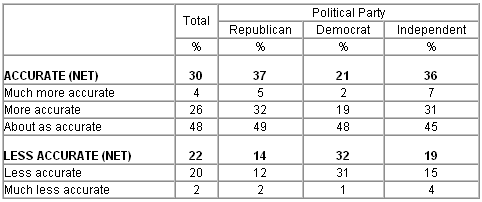Blog Readership Increasing — Or Not
Have you hopped aboard the blog bandwagon? If you haven’t, you’ll probably find it crowded when you do. A new study says readership of online journals has grown significantly during this past year. The was done by the Pew Internet and American Life Project. It says 27 per cent of adults in the U.S. who spend time online said in November they had checked out a blog or two. That compares with just 17 per cent who said in February that they had read an online journal.
An official with the Pew project says blogs that cover the tsunami disaster and relief efforts in South Asia and in Africa are bound to increase blog awareness in the coming months.
Bustling blogosphere gets hype, not readers
Blog, blog, blog. If you rely on the news media to keep on top of the latest trends, you can’t be blamed for thinking that blogs – the Internet’s jargon for personal Web journals – are the biggest thing since e-mail. Howard Dean’s campaign blog was the reason he became an unlikely front-runner in the Democratic primary. Bloggers were the darlings of the summer’s Democratic convention, and the people who brought down Dan Rather by questioning his reporting. “Blog” was the most looked-up word on Merriam-Webster’s Web site in 2004, and bloggers were named one of the “People of the Year” by ABC News. If you’re not keeping a blog, or at least reading them, you’re hopelessly behind the times, right?
Well, don’t panic. A survey released Sunday by the Pew Internet & American Life Project found that 62 percent of Internet users don’t really know what blogs are. The survey reveals that blogs, as interesting as they may be to journalists, have yet to capture the imagination – or the eyeballs – of the general public.
“I just think it’s kind of a waste of time,” said Peter Hoytema, the pastor at Midland Park Christian Reformed Church in Ridgewood. “I don’t find a whole lot of productive discussion coming out of them. I’d rather read newspapers or The New Yorker or something to get some good insightful commentary on world events.”
Still, it’s a rapidly growing diversion. The percentage of Internet users who say they read blogs – short for “Web logs” – jumped from 17 percent in February to 27 percent in November. And the percentage of users who have created blogs rose from 5 percent to 7 percent.
Two rather different takes on the same survey!
One wonders why the commentary of a random pastor would be the definitive word on the utility of an emerging medium. Otherwise, the two stories are both correct. Blogs, which have made significant contributions to the public discourse since 9/11 or so, really came into their own this year. Still, they remain in the “emerging” category, with most people still largely unfamiliar with what goes on here. Of course, I suspect much fewer than 27 percent of the online community reads the New Yorker or even a daily newspaper.
Update (1009): NYT also has a story on blogs today: Myths Run Wild in Blog Tsunami Debate. The blog in question? Democratic Underground, which the Times characterizes as “a blog for open discussion and an online gathering place for people who hate the Bush administration.” As Glenn Reynolds notes, DU is not a blog but “a bulletin board.” And a rather loony one at that. He asks, “Is the NYT going out of its way to try to make blogs look bad, or are their reporters just that clueless?” The two options are not, however, mutally exclusive. Wizbang‘s Paul is also referenced in the piece. (See Paul’s note here.)
Update (1148): I looked for the actual survey on Pew’s site earlier but could not find it. I’ve just discovered it via a link from yet another report on the story.
Report: Technology & Media Use–The state of blogging (Pew)
By the end of 2004 blogs had established themselves as a key part of online culture. Two surveys by the Pew Internet & American Life Project in November established new contours for the blogosphere: 8 million American adults say they have created blogs; blog readership jumped 58% in 2004 and now stands at 27% of internet users; 5% of internet users say they use RSS aggregators or XML readers to get the news and other information delivered from blogs and content-rich Web sites as it is posted online; and 12% of internet users have posted comments or other material on blogs. Still, 62% of internet users do not know what a blog is.
View PDF of Report






The mainstream press is generally clueless on a lot of things.
I always find it incredibly stupid whenever any commentator claims that Dean was the “front-runner in the Democratic primary” due to blogs. Dean was NEVER a front-runner–if I remember correctly, he lost every primary except Vermont. Dean bloggers may have been important for raising money for his candidacy, but they had minimal effect in generating substantial support for his candidacy.
If anything, according to this logic the Dean example would support the thesis that blogging is rather marginal to the public discourse (not that I am advocating this argument).
I noticed that MSM articles on blogs seem to go out of their way to make blogs seem inconsequential. Few of the articles mention the specific names of the blogs that brought down Dan Rather and CBS, i.e. Power Line and Little Green Footballs. Now Belmont Club and Diplomad are going after the UN–but the MSM doesn’t mention this. There is also very little on Jihadism and the true beliefs of Islam mentioned–which the blogs are exceptional in analyzing.
Dean was certainly the frontrunner until right before the Iowa primaries–although not so much because of blogs. But he was the runaway favorite in all the polls until his candidacy began to implode right after the capture of Saddam Hussein.
James,
I would argue that polls taken that early are inconsequential since much of the public isn’t paying close attention to the Presidential race. Wasn’t McCain “leading” the polls at that point in 1999?
People paying close attention to the race, of course, are a minority of the poeple who actually wind up voting (the only “poll” that matters). Dean polled high with those folks probably because of his anti-war stance.
MSM prefer to report on blogs as if they’re some kind of exotic disease, or fad, sweeping the seamy underbelly of American society.
It would seem that until blogs get over whatever the MSM has to say, or how they characterize blogs, this insecurity will remain. What do you expect ? Papers didn’t go away after the telegraph, radio didn’t go away after TV, MSM will not go away because of blogs. All will eventually co-exist is some way.